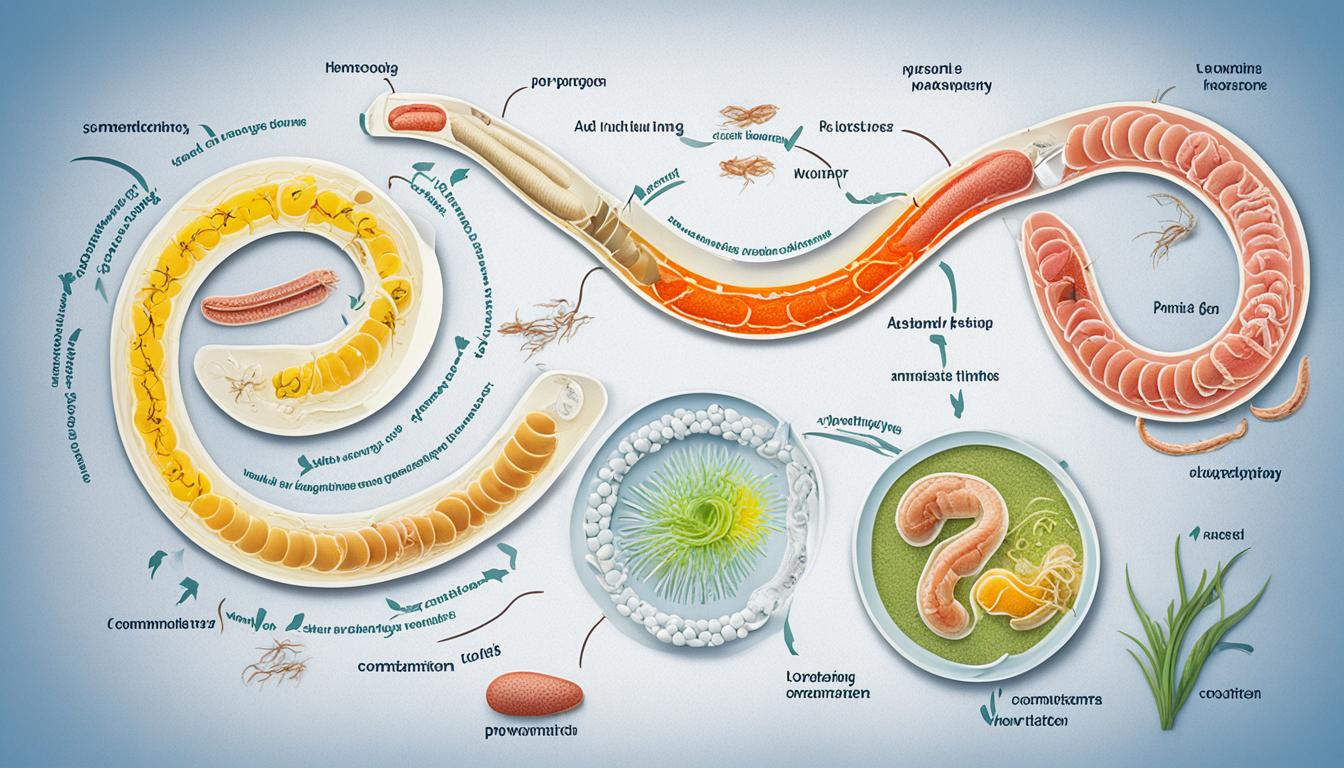Pinworm infection is a common problem that mostly affects kids. It’s called enterobiasis and is caused by the Enterobius vermicularis parasite. This parasite lives in the anal area, feeding on blood. It lays eggs around the anus causing severe itching. These eggs then spread to others.
This disease makes the anal area itch and sometimes causes pain for girls. It can even lead to appendicitis. Treating it means using mebendazole or albendazole. To stop it, everyone, especially kids, should keep clean and deworm often.
Key Takeaways
- Pinworm infection, or enterobiasis, is a common parasitic infection mainly affecting children.
- Pinworms multiply in the anal area, causing intense anal itching.
- The parasites lay their eggs in the folds of the anus, leading to the transmission of pinworms.
- Pinworm infection can cause symptoms such as itching, presence of pinworm larvae in the stool, and even appendicitis.
- Treatment involves using medications like mebendazole or albendazole, while prevention focuses on good hygiene and regular deworming.
Causes and Development Characteristics of Pinworm Infection
Pinworm disease comes from pinworm parasites, specifically Enterobius vermicularis. These parasites are milky white with a distinctive shape. They have a slightly bulging head and a notched tail.
Female pinworms lay eggs which are then spread in the environment. Under the right conditions, these eggs hatch into larvae. This happens in specific temperatures and humidities.
The main way people get infected is by the oral-fecal route. This means the person unknowingly swallows the eggs. This can happen after touching something with the eggs on it. It’s crucial to understand that these eggs only turn into larvae in specific conditions. Getting pinworms through other ways is very unlikely.
Symptoms and Diagnosis of Pinworm Infection
Pinworm infection is also called enterobiasis. It shows up with symptoms that are key to catch early. The main symptom is a strong need to scratch around the bottom, especially at night. This can make people, particularly kids, feel very uncomfortable and may even affect their sleep.
Other signs of pinworms can be seen, like spotting worms in the stool. Girls might feel itchy in their private parts or have issues with their periods. Sometimes, pinworms can even cause problems in the appendix.
Doctors start looking into pinworms with a detailed history. They ask about symptoms and see if there are any risk factors involved. Next, they do a checkup that may show things like red marks near the bottom, which can confirm the infection.
For a clear diagnosis, doctors often use lab tests. These might mean checking the skin around the bottom or testing the stool. The goal is to find evidence of pinworms, like their eggs or tiny worms. These tests are accurate and help in setting up the right treatment plan.
Symptoms and Diagnosis of Pinworm Infection
| Symptoms | Diagnosis |
|---|---|
| Anal itching, especially at night | Thorough medical history |
| Presence of pinworm larvae in the stool | Physical examination |
| Vaginal itching and menstrual disorders in females | Laboratory tests |
| Appendix involvement leading to appendicitis | – |
Getting the right diagnosis for pinworms is key. It helps doctors pick the best treatment and steps to stop the spread of the infection. Knowing for sure means acting fast to control it.
Conclusion
Pinworm infection is a common issue, especially among kids. Quick pinworm treatment is key to stop symptoms and prevent spreading. Medicines such as mebendazole or albendazole can get rid of the parasites. Treating everyone around those infected helps stop it from coming back.
Keeping clean is a big part of preventing pinworms. Be sure to wash your hands with soap often, especially before eating and after using the bathroom. Short nails, clean beddings, and fresh clothes also help. Don’t forget about regular deworming, which is super important for kids and others at risk.
With the right steps and fast action, dealing with pinworms isn’t so hard. Staying informed, keeping clean, and treating the issue right away are your best defenses. Remember, knowledge and cleanliness are powerful tools against pinworms.

